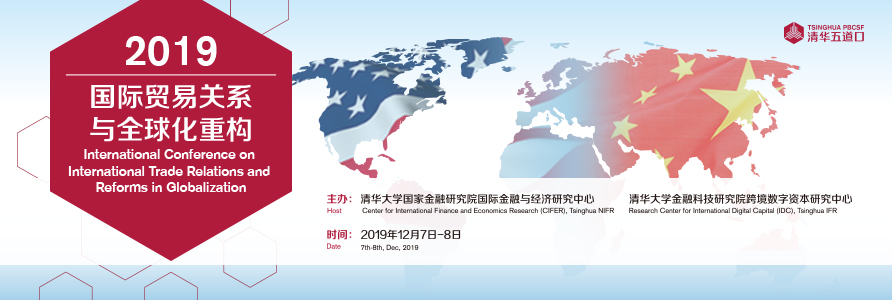
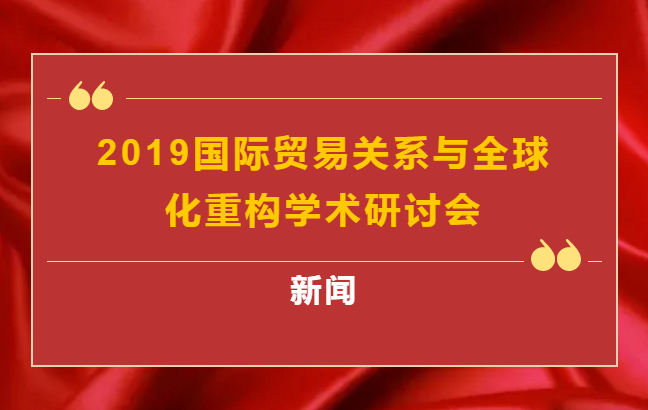
2019年12月7日,由清华大学五道口金融学院国家金融研究院国际金融与经济研究中心(CIFER)与清华大学金融科技研究院跨境数字资本研究中心(IDC)联合举办的 “2019国际贸易关系与全球化重构”学术研讨会(International Conference on International Trade Relations and Reforms in Globalization)在清华大学大礼堂隆重开幕。又是一年十二月,第二届国际贸易关系会议如期举行,本届会议一经发起就得到了多方热烈响应,近百位来自政界、学界和业界的专家学者从世界各地共赴盛会,共享学术之花。会议各会场共报名超过3000人次,共征集文章200余篇,志愿者投递简历近300份,发言嘉宾50余人,开幕式观众过千人。
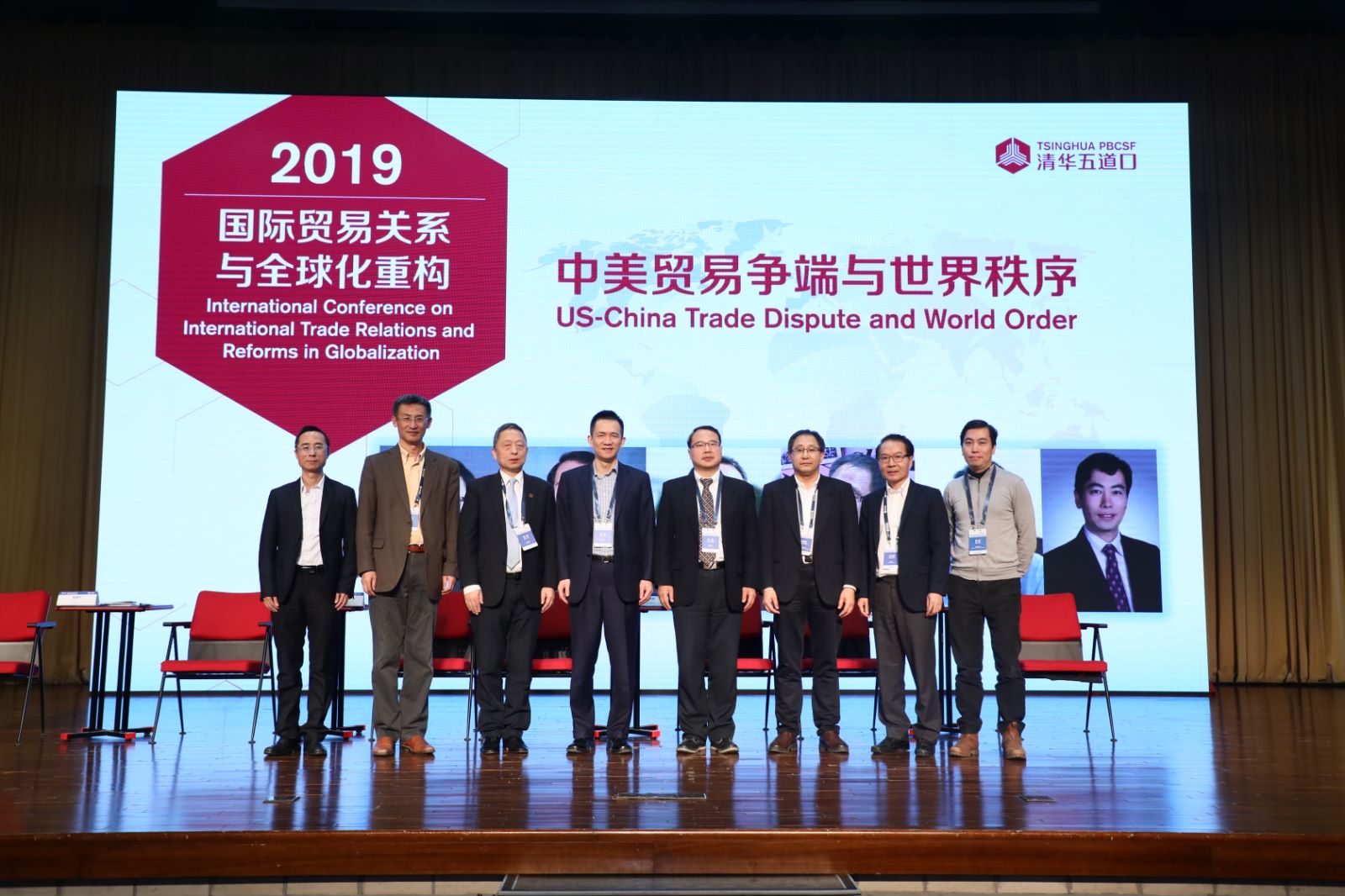
(图为参会嘉宾合影)
本届研讨会开幕式的主题为“中美贸易争端与世界秩序”,开幕式在清华大学五道口金融学院紫光金融学讲席教授、清华大学国家金融研究院国际金融与经济研究中心(CIFER)主任鞠建东的主持下正式拉开帷幕,他向与会来宾的出席表达了热烈的欢迎和诚挚的感谢,并邀请清华大学五道口金融学院副院长、国家金融研究院副院长、紫光金融学讲席教授周皓致开幕辞。
周皓教授在开幕致辞中表示,中国与美国是全球最大的两个经济体,中美两国恰当解决贸易争端不仅对两国经济稳定和发展十分重要,对世界也有重要意义。周皓教授认为,纵观历史,重要历史争端和危机后,经济学术理论方面都会涌现巨大的创新。因而,尽管中美贸易争端的日渐激烈令人无比忧心,我们却对国内学界的学术成长和智慧贡献感到欣慰与期待。同样,贸易争端和摩擦与每个微观主体都息息相关。今天国际贸易争端冲突的讨论,无论是对国家的经济政策,学者的理论创新,还是个体防控各类经济风险,都有重要意义。
在开幕致辞最后,周皓教授代表清华五道口金融学院与国家金融研究院,预祝会议圆满成功。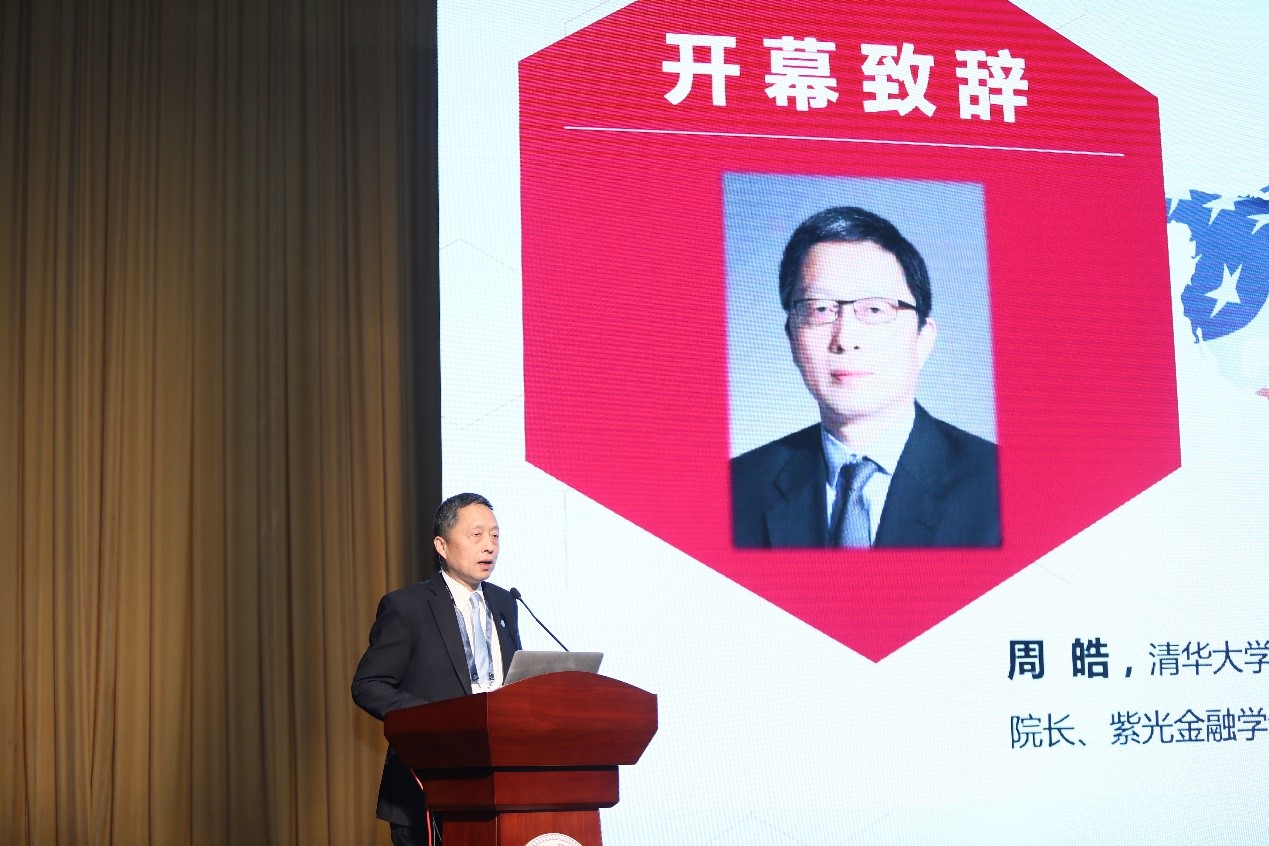
(图为周皓教授致开幕词)
接下来,北京大学国家发展研究院院长、博雅特聘教授、长江学者姚洋发表了题为“中美不会脱钩”的主旨演讲,姚洋教授认为中美不会脱钩,原因有三个方面,一是中国不愿意脱钩,中国也不能脱钩;二是美国的商界不愿意脱钩;三是其它国家也不愿意看到中美脱钩。关于中美贸易争端方面,姚洋教授提到了“中美贸易争端倡议”中的四个篮子,一是“与邻为壑”的政策应该是绝对禁止的;二是对其它国家有负面影响的国内政策是可以谈判的;三是面对不利的外部影响时,国家可以施行适当的自我保护措施;四是“多边机制”篮子。同时,姚洋教授提出了三个看法:首先中国要坚持自己的政治制度、历史和文化;其次美国也有要调整的地方;最后中国要适应自己的新角色,中国是世界第二大经济体,是特殊的发展中国家。最后,姚教授就观众的提问,诸如技术脱钩、美国的商界影响美国政府政策的制定、经济的绿色转型等问题进行了详细的解答。
 (图为姚洋教授发表主旨演讲)
(图为姚洋教授发表主旨演讲)
随后,鞠建东教授在题为“中美贸易争端的主要冲突、基本矛盾,战略与战术”的主旨演讲中指出,当前中美贸易争端的一个核心问题是世界秩序如何演变,而我们面临两个基本矛盾:三足鼎立的经济结构与美元主导的货币体系的矛盾以及三足鼎立的经济结构与美国主导的治理体系的矛盾。全球经济基础揭示了三足鼎立的结构,中美贸易争端取决于60%的世界其他国家,这就是第三国效应。
我们要坚持竞争共存的四项原则:在两国具有比较优势的领域应坚持加强国际贸易的互惠政策、在非军事高科技领域应坚持良性的竞争政策、在军用技术的竞争方面应坚持对等的双边对抗政策、坚持不搞多边对抗政策,不要求第三国站队。
最后,我们还要防范日本式危机、前苏联式危机、国际金融危机、社会危机、军事安全风险等五大危机。中国应坚持的战略是:不称王、谋共享、稳市场,战术是不理他。
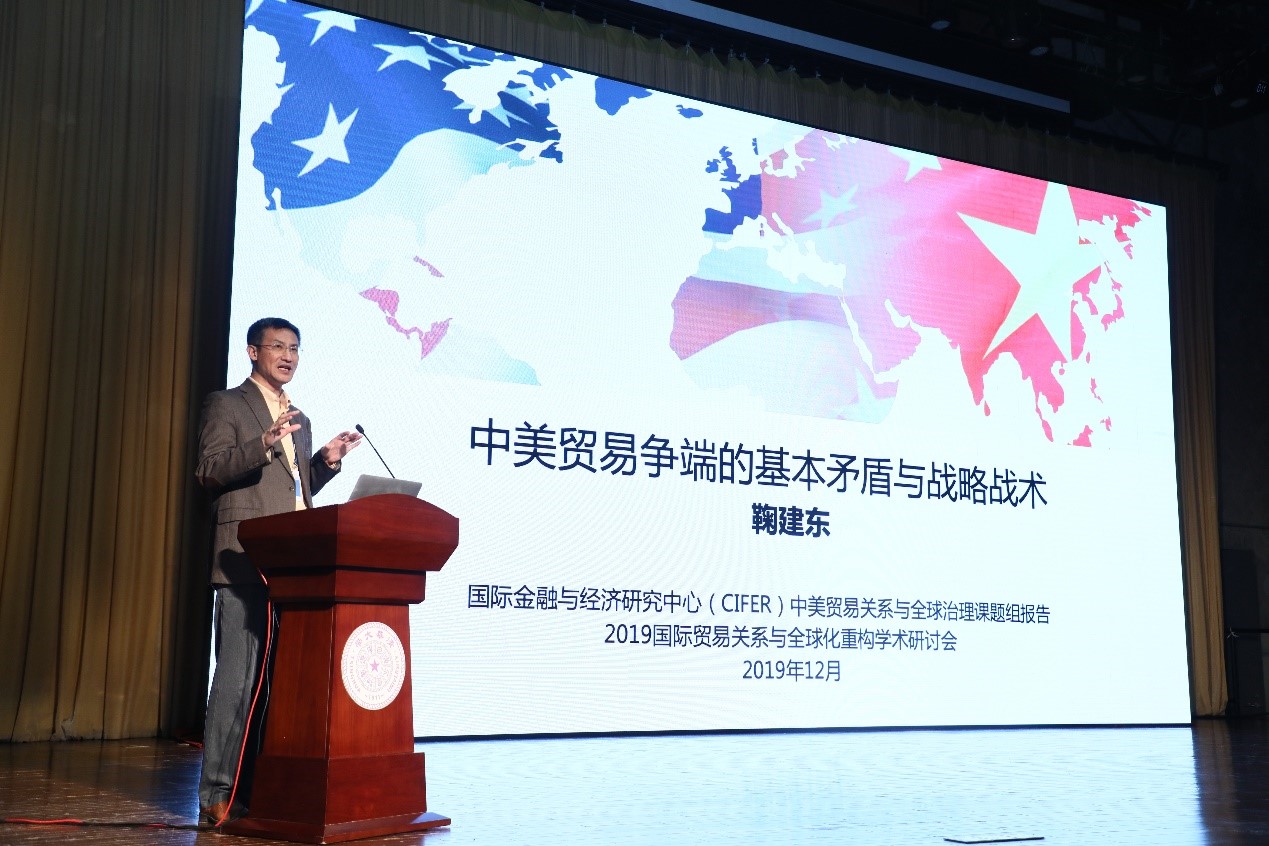 (图为鞠建东教授发表主旨演讲)
(图为鞠建东教授发表主旨演讲)
大论坛的第二部分是嘉宾圆桌论坛,七位国际经贸领域的顶级专家围绕“中美贸易争端与世界秩序”为主题,每人做了十分钟的发言并进行了交叉讨论。
 (图为嘉宾讨论环节)
(图为嘉宾讨论环节)
首先,清华大学五道口金融学院副院长、国家金融研究院副院长、紫光金融学讲席教授周皓提出三个主要的观点:首先,中美贸易摩擦是长期问题,可能持续五十年左右的时间;其次,中美贸易摩擦对中国经济实际影响不大;最后,我们应调整国内长期的结构性政策,来应对贸易摩擦的负面影响,而关键在于城镇化和房地产的健康发展。
 (图为周皓教授发言)
(图为周皓教授发言)
香港大学经济及工商管理学院副院长、钟瀚德(经济发展学)基金教授丘东晓探讨了中美贸易争端的解决办法。他同意周皓教授所讲的中美贸易摩擦会是一个长期进行的状态和问题,但同时也认为中美贸易的摩擦是不可避免的。此外,他从中美问题中抽离出来,以一个简单的例子说明了中美的摩擦将会是长期存在的又是不可避免的,他也表示对中美矛盾的解决呈悲观的态度。
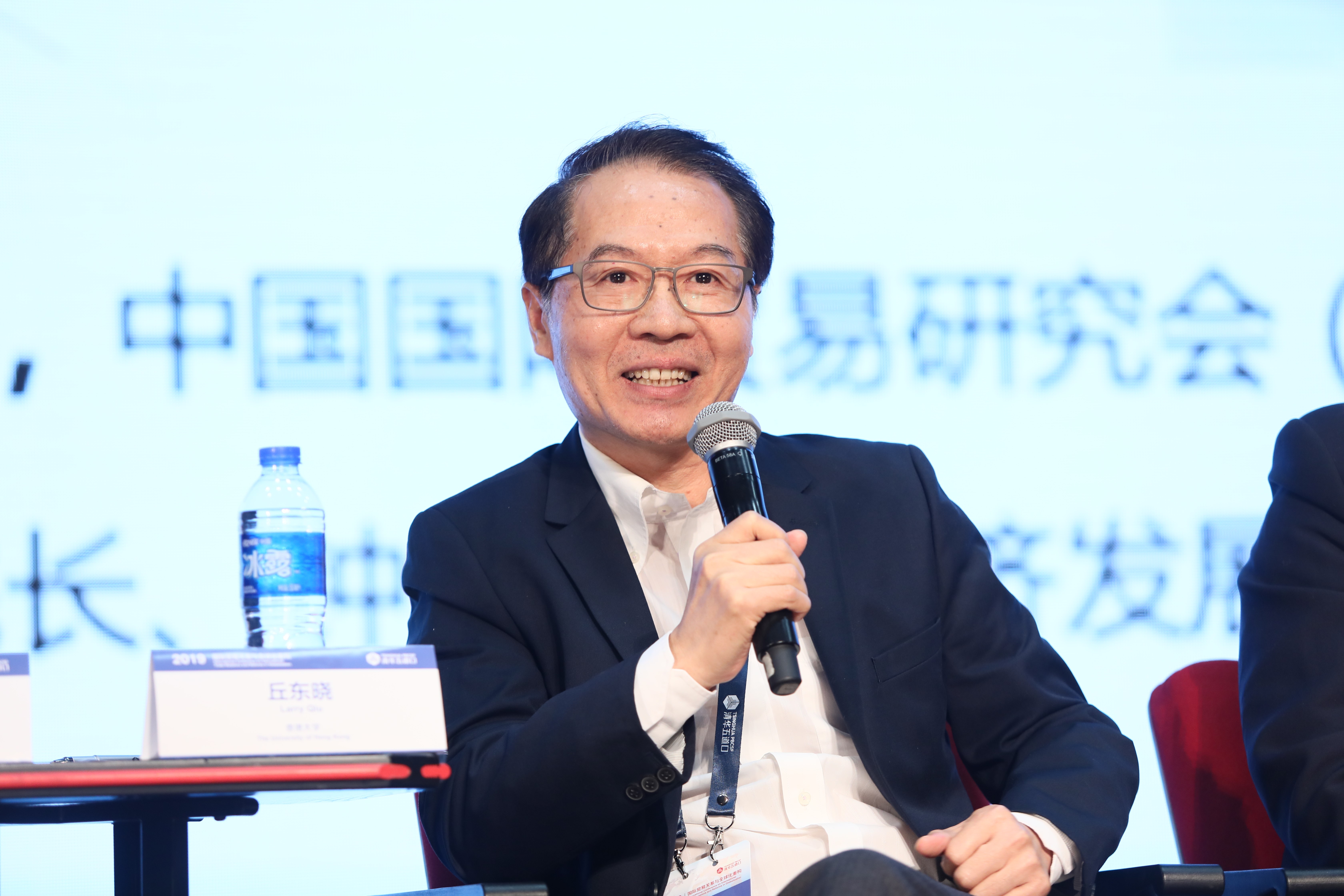 (图为丘东晓教授发言)
(图为丘东晓教授发言)
北京大学国际政治经济研究中心主任、北京大学国际关系学院教授王勇的发言主题为警惕中美“新冷战”:中国的“塑造”作用与对策。由于当前美国对华贸易战从关税战上升为科技战、货币战、金融战,故中美有可能掉入“修昔底德”陷阱。中国要以更大的开放应对日益“关门”的美国,深化改革开放,促进中美中西人文交流,在外宣中注重强调中国模式中国体制与世界主流模式体制的共通性,建议中国尽快提出加入CPTPP。
 (图为王勇教授发言)
(图为王勇教授发言)
对外经贸大学全球价值链研究院常务副院长殷晓鹏教授则在发言中分析了美国政府和其智囊对中美贸易的四种基本观点,指出目前中美之间以及贸易问题是一个多元化问题,并没有什么美国全国对华的共识。他提出了两点建议:一是需长期关注中国法治建设问题,法制建设不仅是解决对外纠纷的一个重要的解决方法,而且是中国长期发展的基础和根本;二是要坚持建设和发展国际统一战线,帮助中国更好地融入世界,也帮助各国更好的了解中国。
 (图为殷晓鹏教授发言)
(图为殷晓鹏教授发言)
中国WTO 研究会常务理事、对外经济贸易大学国际经济贸易学院教授崔凡指出,中美经贸关系将在下周面临两个重要的时间点:一个是12月10日,世界贸易组织上诉机构停摆;第二个是12月15日,美国可能将对新一批的中国商品加征关税。我们的谈判空间和底线,应该是一个使竞争中性和所有制中性相配合的体制。
 (图为崔凡教授发言)
(图为崔凡教授发言)
华中科技大学开放与发展研究中心主任、楚天学者陈波教授的发言主题为:从贸易战到金融、科技战,我国的因应策略建议。他指出,若要应对中美贸易战,中国应深化改革、加快开放,建立多边规则,签署多边协议,适当刺激经济,保持国内经济平稳健康发展。
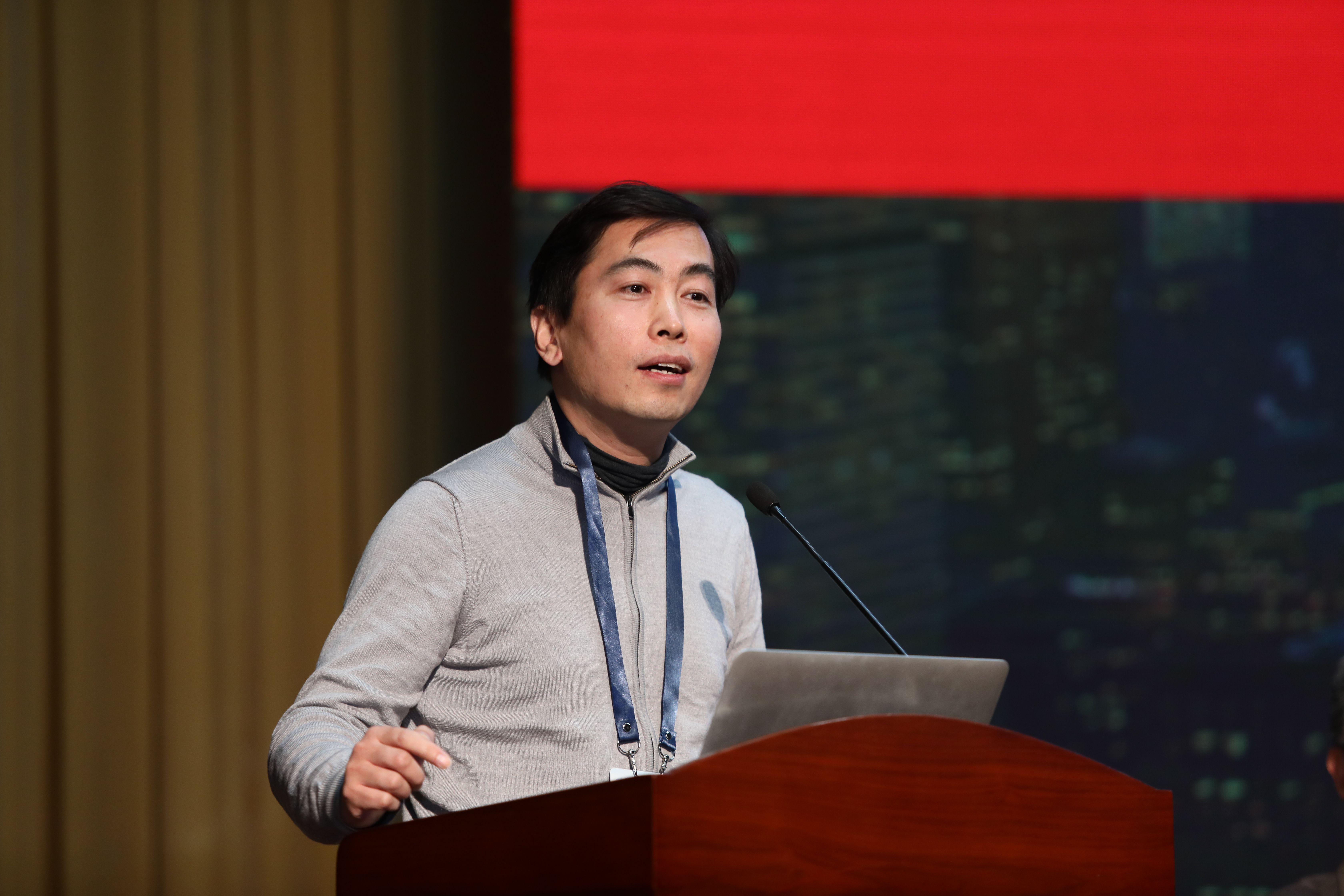 (图为陈波教授发言)
(图为陈波教授发言)
在随后的观众提问环节中,观众代表提出了关于中美如何达成共识、都市化如何实现等问题,并与嘉宾进行了热烈的讨论。
在最后的总结发言中,鞠建东提到:中美贸易争端论坛是一个由清华大学五道口金融学院国际金融与经济研究中心(CIFER)举办的年度论坛,去年12月份首次举办,此次论坛对过去一年多来的中美贸易争端做了一个回顾。他的最大的感受就是两个字,“自信”!他说:去年召开论坛的时候,无论是嘉宾发言,还是听众提问,感觉大家还有很多的焦虑,有一些不知所措。但是今天的论坛,感觉最大的是逐步形成了两点共识。第一,我们大部分人都认识到,中美争端不可避免,也是一个长期的斗争。既来之,则安之。我们愿意,有信心,有能力长期面对。第二,是面对美方的不确定性,面对世界局势的变化,一年多来,中国开放的决心与步骤越来越确定。无论中美贸易争端如何变化,中国对美国之外的占世界GDP60%的世界其他国家和地区的开放越来越确定;无论中美贸易争端如何变化,中国对美国愿意向中国开放的人士、企业的开放越来越确定,对美对华贸易和投资的开放越来越确定。一年来的中美贸易争端考验了中国人民,中国人民越来越坚定,越来越成熟;中国的开放政策越来越坚定,越来越确定,越来越成熟。
 (凛冬已至,热情的观众们早早在清华大礼堂前排起长龙,等待入场)
(凛冬已至,热情的观众们早早在清华大礼堂前排起长龙,等待入场)
 (近千人的现场观众们布满了清华大礼堂现场,认真聆听嘉宾们的精彩分享)
(近千人的现场观众们布满了清华大礼堂现场,认真聆听嘉宾们的精彩分享)
English Version
The opening ceremony of the 2019 International Conference on International Trade Relations and Reforms in Globalization kicked off on December 7, 2019 at the Auditorium of Tsinghua University. The second year of the conference was held by Center for International Finance and Economics Research (CIFER) of Tsinghua NIFR and Research Center for International Digital Capital (IDC) of Tsinghua IFR, welcoming nearly 100 renowned scholars and 3000 audiences from all over the world.
Themed on "US-China Trade Dispute and World Order", the opening ceremony was hosted by Professor Ju Jiandong, Unigroup Chair Professor of Finance, Changjiang Scholar and Director of the Center for International Finance and Economics at the PBC School of Finance in Tsinghua University, After extending a warm welcome and expressing his sincere gratitude to the guests, Professor Ju invited Professor Zhou Hao to deliver the opening speech.
Zhou Hao, Associate Dean and Unigroup Chair Professor of Finance at Tsinghua PBCSF, pointed out that the proper settlement of trade dispute between China and the United States was important not only for both countries but also the whole world since they were the two largest economies in the world. Professor Zhou believed that innovations in economic theory would largely emerge after major dispute and crises. Although it was an anxious period, he was still excited about our academic growth. Without a doubt, today’s discussion on international trade dispute was critical for economic policy, innovation in theory, and various types of risk. At the end of the opening speech, Professor Zhou, on behalf of Tsinghua PBCSF and the National Institute of Financial Research at Tsinghua University (NIFR), wished the meeting a great success.
Next, Yao Yang, Chang jiang Scholar and Boya Chair Professor of Economics at the China Center for Economic Research (CCER) and the National School of Development (NSD) at Peking University, delivered a keynote speech entitled "China and the United States will not decouple". Professor Yao believed that China and the United States would not decouple for three reasons: 1. China was unwilling and was to decouple from the U.S. 2. American business was unwilling to decouple from China. 3. Other countries didn’t want it happen. Regarding US-China trade dispute, Professor Yao mentioned the “Four Buckets” framework from the “the US-China Trade Policy working Group Joint Statement": 1.The "Prohibited" Bucket: “Beggar Thy Neighbor” policies should be prohibited. 2. The “Bilateral Discussions and Adjustments” Bucket: a mutually beneficial bargain can be worked out between the two nations that entails the removal of the policies in question. 3.The “Domestic Adjustments” Bucket: implementing appropriate self-protection measures in the face of adverse external influences. 4. The “Multilateral Governance” Bucket. In this situation, China should adhere to its own political policy, history and culture and adapt to the new role since China was the second largest economy in the world and a special developing country. In the end, Professor Yao gave detailed answers to questions from the audiences, such as the decoupling of technology, the influence from the American business on the formulation of US government policies, and the green transformation.
Subsequently, Professor Ju pointed out in a keynote speech entitled "Main Conflicts, Basic Contradictions, Strategies and Tactics of US-China Trade Dispute "that the core issue of the current US-China trade dispute was how the world order evolved. China was facing two basic Contradictions: one was the contradiction between the tri-polar economic structure and the dollar-led currency system, and the other was between the tri-polar economic structure and the US-led governance system. The global economic foundation revealed that 60% of the other countries were the key to US-China trade dispute, which was the third-country effect.
Professor Ju believed that China should insist on the four principles of “Competitive Coexistence”: 1.mutually beneficial policies; 2. competing policies; 3. bilateral confrontation policies; 4. multilateral confrontation policies. There were also five crises that China should prevent from: the Japanese crisis, the former Soviet Union crisis, the international financial crisis, the social crisis, and military security crisis. The strategy China should adhere to was: not claiming to be king, sharing, stabling the market, and ignoring the enemy.
At the second part of the conference, seven experts made their ten-minute statement on US-China trade dispute and world order.
Professor Zhou put forward three viewpoints: First, US-China trade dispute was a long-term problem that might last for about fifty years. Second, US-China trade dispute had little impact on China’s economy. Third, China should adjust the domestic structural policies to face the challenge, where the key was healthy development of urbanization and real estate.
Qiu Dongxiao, Chung Hon-Dak Professor in Economic Development and Associate Dean of the School of Business and Economics at the University of Hong Kong, then discussed the solution to the US-China trade dispute. He agreed with Professor Zhou that the US-China trade dispute would be a long-term problem, and it was also inevitable. Professor Qiu expressed his pessimistic attitude towards the US-China conflicts.
Wang Yong, Professor of the School of International Studies and Director of the Center for International Political Economy at Peking University, delivered a speech “Attention to the New Cold War between China and the United States: China's "shaping" role and countermeasures”. Because the current US-China trade war had upgraded from a tariff war to a technology war, currency war, and financial war, China and the United States might fall into the"Thucydides" trap. China should respond to the increasingly “closed” United States with greater openness, deepen reform, and further cultural exchange. Professor Wang suggested that China should propose to join the CPTPP as soon as possible.
Yin Xiaopeng, Associate Dean of Research Center for International Economics and, Associate Professor of School of International Trade and Economics at University of International Business and Economics, analyzed the four basic viewpoints on US-China trade dispute from the US government and its think-tank in his speech. He pointed out that the current issue was a diversified problem, and there was no consensus among American people. Professor Yin made two proposals: 1. China should pay more attention to legal system construction, which was not only an important solution to resolve dispute, but also the foundation of China’s long-term development. 2. In order to help China better integrate into the world, China should insist on the construction of the international united front.
Cui Fan, Professor of School of International Trade and Economics at University of International Business and Economics and Research Fellow of China National Institute of WTO, said that there were two critical moments next week: WTO’s Appellate Body would shut down on December 10 and the United States planed new tariffs for Chinese goods on December 15. The room and bottom line for negotiation should be a system combing with neutral competition and ownership.
Chen Bo, the Director of Opening and Development Research Center at Huazhong University of Science and Technology, delivered his speech entitled “From Trade War to Financial and Technology War, What should China Do.” He believed that China should deepen reform, accelerate opening up, establish multilateral rules, sign multilateral agreements, properly stimulate the economy, and maintain a stable and healthy development of the domestic economy.
In the subsequent questioning session, the audience representatives raised questions about how China and the United States reached consensus and how to achieve urbanization, where the audience had a lively discussion with the guests.
In the final concluding remarks, Professor Ju mentioned his biggest feelings could be concluded as a word, "confident” ! Compared to today’s conference, he felt that guests and audiences were anxious and even at a loss last year. However, this situation changed since most of Chinese people realized that the US-China dispute was inevitable and would be along-term issue. Professor Ju said: Chinese people are confident and willing to face the problem for a long term and we determined to open to the world and moved forward over the past year. No matter how the US-China trade dispute changed, China was certain to open to American people, American companies and the rest of the world, which accounts for 60% of the world’s GDP. The US-China trade dispute over the past year had tested the Chinese people, Chinese people and opening-up policy were becoming more and more determined and mature.
